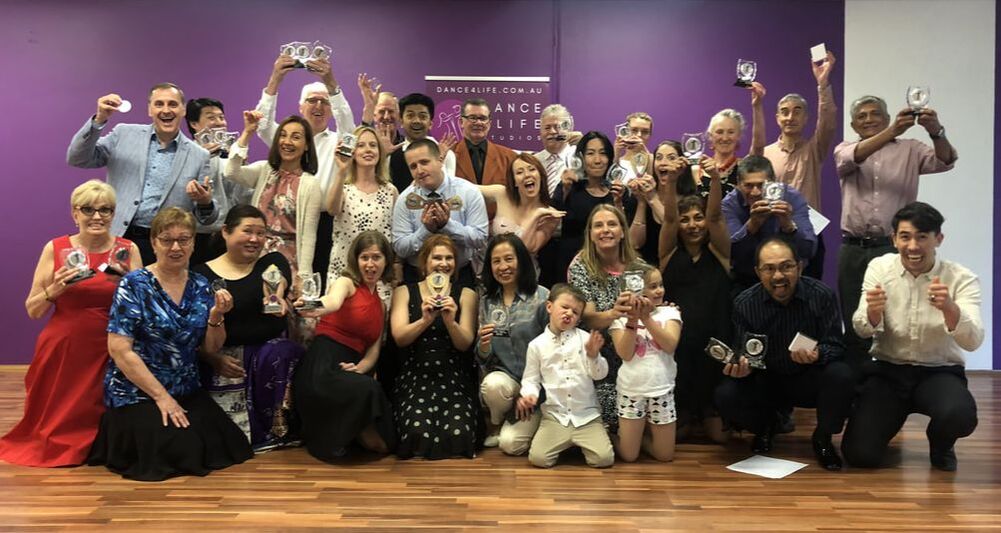What are Medal Demonstrations?Medals and demonstrations are a traditional way to pass milestones in many forms of dancing. Dance 4 Life has a unique social dancing focus, and thus medal events are about students presenting an improvized social dance demonstration using lead and follow skills. These are the same skills we aim to develop for you to use at dance nights and elsewhere!
|
How Does the Demonstration Work?
To earn a medal, students must demonstrate 2 or more dances in one of the Dance 4 Life genres. Candidates will lead or follow the steps and techniques of the medal level as per the D4L syllabus.
- The medal can be presented as Student/student, or Teacher/student.
- Each dance will be 1 to 2 minutes.
- Crystal level medals consist of 2 dances, while Bronze has 3, Silver has 4, and Gold/Star have 5.
- Dances should be improvized and demonstrate party-style social lead/follow
What Skills need to be Demonstrated?
- Dance patterns with correct foot positions and correct timing.
- Lead & follow skills (based on each level) (e.g. Frame, Visual cues, correct footwork & timing)
- Also, in Bronze & above, refined footwork and leg actions.
- Also, in Silver & above, refined upper body action
What Happens after the Demonstration?
- You will receive a certificate & medal trophy
- You will also get constructive written feedback to help you as you move to the next level
Medals are overseen by head instructors RJ & Ali. Medals can seem intimidating, but Dance 4 Life Medal events are conducted in a very supportive environment with other students, medal candidates and instructors.
Why Do a Medal Demonstration?Working towards a medal demonstration helps to focus and consolidate your dance learning. Social dancing is a skill, and Dance 4 Life uses a medal-based syllabus to continuously develop good quality social dancing. Just like with any type of dancing, there are many levels that can be achieved. Medal levels and presentations allow you to track your own progress and allows us to recognize students who continue to improve their social dancing ability.
|
Is it Compulsory?
Participation isn’t compulsory, but if you’ve been invited, it means we think you’re ready for the medal to formally recognize your progress! Working through the medal levels and demonstrating your dancing is part of the Dance 4 Life learning process. When the mind sets a goal, it focuses harder on improvement and details to ensure it achieves that goal! It can be challenging, but also fun and rewarding!
|
MEDAL GENRES & LEVELS
- Students can achieve their medals in the 4 main dance genres of (1) Street Latin, (2) Brazilian, (3) Ballroom Latin and (4) Social/Modern Ballroom.
- There are 5 main levels (Crystal, Bronze, Silver, Gold and Star) with additional sublevels in each level.
- The completion of each main level is known as the "Elite" medal.
- More dance styles are required to be presented as students present for higher levels.
Medal Levels
- Crystal - Crystal 1 & Crystal 2
- Bronze - Bronze 1, Bronze 2 & Bronze 3 Elite
- Silver - Silver 1, Silver 2 & Silver 3 Elite
- Gold - Gold 1, Gold 2 & Gold 3 Elite
- Star - Star 1, Star 2, Star Elite
Medal Dances Order by Genre & Level
|
Street Latin
|
Brazilian Latin
|
|
Ballroom Latin
|
Social & Modern Ballroom
|
